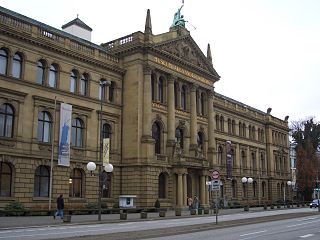
The Basic Law for the Federal Republic of Germany is the constitution of the Federal Republic of Germany.

The Constitution of the Irish Free State was adopted by Act of Dáil Éireann sitting as a constituent assembly on 25 October 1922. In accordance with Article 83 of the Constitution, the Irish Free State Constitution Act 1922 of the British Parliament, which came into effect upon receiving the royal assent on 5 December 1922, provided that the Constitution would come into effect upon the issue of a Royal Proclamation, which was done on 6 December 1922. In 1937 the Constitution of the Irish Free State was replaced by the modern Constitution of Ireland following a referendum.

The National Assembly was the authoritative legislative body of the Republic of China, from 1947 to 2005. Along with the Control Yuan and the Legislative Yuan, the National Assembly formed the tricameral parliament of China.
A constitutional amendment is a modification of the constitution of a polity, organization or other type of entity. Amendments are often interwoven into the relevant sections of an existing constitution, directly altering the text. Conversely, they can be appended to the constitution as supplemental additions, thus changing the frame of government without altering the existing text of the document.

A constituent assembly is a body assembled for the purpose of drafting or revising a constitution. Members of a constituent assembly may be elected by popular vote, drawn by sortition, appointed, or some combination of these methods. Assemblies are typically considered distinct from a regular legislature, although members of the legislature may compose a significant number or all of its members. As the fundamental document constituting a state, a constitution cannot normally be modified or amended by the state's normal legislative procedures in some jurisdictions; instead a constitutional convention or a constituent assembly, the rules for which are normally laid down in the constitution, must be set up. A constituent assembly is usually set up for its specific purpose, which it carries out in a relatively short time, after which the assembly is dissolved. A constituent assembly is a form of representative democracy.

The Spanish Constitution is the supreme law of the Kingdom of Spain. It was enacted after its approval in a constitutional referendum; it represents the culmination of the Spanish transition to democracy. It is a written constitution.

The original Constitution of East Germany was promulgated on 7 October 1949. It was heavily based on the Weimar Constitution and nominally established the GDR as a liberal democratic republic. In 1968 the East German government adopted a new, fully Communist constitution that was based on Marxism-Leninism, political unitarism, and collective leadership. There were further amendments to the 1968 constitution in 1974. With the political events of 1989, there were attempts to draft a new constitution for East Germany, but these efforts never materialized due to the dissolution of East Germany and the accession of its states into the neighboring Federal Republic.

The Constitution of the Republic of Croatia is promulgated by the Croatian Parliament.

The Landtag of Bavaria, officially known in English as the Bavarian State Parliament, is the unicameral legislature of the German state of Bavaria. The parliament meets in the Maximilianeum in Munich.

The Constitution of the Bolivarian Republic of Venezuela is the current and twenty-sixth constitution of Venezuela. It was drafted in mid-1999 by a constituent assembly that had been created by popular referendum. Adopted in December 1999, it replaced the 1961 Constitution, the longest-serving in Venezuelan history. It was primarily promoted by then President of Venezuela Hugo Chávez and thereafter received strong backing from diverse sectors, including figures involved in promulgating the 1961 constitution such as Luis Miquilena and Carlos Andrés Pérez. Chávez and his followers (chavistas) refer to the 1999 document as the "Constitución Bolivariana" because they assert that it is ideologically descended from the thinking and political philosophy of Simón Bolívar and Bolivarianism. Since the creation of the Constituent National Assembly in August 2017, the Bolivarian government has declared the 1999 constitution suspended until a new constitution is created.

The Parlamentarischer Rat was the West German constituent assembly in Bonn that drafted and adopted the constitution of West Germany, the Basic Law for the Federal Republic of Germany, promulgated on 23 May 1949.

The Constitution of the Italian Republic was ratified on 22 December 1947 by the Constituent Assembly, with 453 votes in favour and 62 against, before coming into force on 1 January 1948, one century after the previous Constitution of the Kingdom of Italy had been enacted. The text, which has since been amended sixteen times, was promulgated in an extraordinary edition of Gazzetta Ufficiale on 27 December 1947.

The Political Constitution of Colombia of 1991, is the Constitution of the Republic of Colombia. It was promulgated in Constitutional Gazette number 114 on Thursday, July 4, 1991, and is also known as the Constitution of Human Rights. It replaced the Political Constitution of 1886 and was issued during the presidency of the liberal César Gaviria, with ideas from the also liberal Luis Carlos Galán.

The National Assembly is one of the two houses (chambers) of the Parliament of Cambodia. It is referred to as the lower house, with the Senate being referred to as the upper house.

The Constitution of Latvia is the fundamental law of the Republic of Latvia. Satversme is the oldest Eastern or Central European constitution still in force and the sixth oldest still-functioning republican basic law in the world. It was adopted, as it states itself in the text, by the people of Latvia, as represented in the Constitutional Assembly of Latvia, on 15 February 1922 and came into force on 7 November 1922. It was heavily influenced by Germany's Weimar Constitution and the Swiss Federal Constitution. The constitution establishes the main bodies of government ; it consists of 116 articles arranged in eight chapters.
Bavaria, one of the states of Germany, has a multiparty system dominated by the Christian Social Union in Bavaria (CSU). Bavaria has long been a bastion of conservative politics in Germany, with the Christian Social Union has won every election of the state parliament since 1946 and having almost a monopoly on power. Every Minister-President since 1957 has been a member of this party. On the other hand the bigger and more liberal, or rather social democratic, cities, especially Munich, have been governed for decades by the Social Democratic Party of Germany (SPD) until recently the second biggest party. In 2018 the Alliance 90/The Greens which have been represented in the state parliament since 1986, became the second biggest political party in the Landtag and in 2020 the biggest party in the Munich City Council. From the historical point of view, older Bavaria was one of the most liberal, predominantly Roman Catholic states until the rather rural areas of Swabia and Franconia were added in 1814/15 at the Congress of Vienna.
The Constitution of the Philippines is the constitution or the supreme law of the Republic of the Philippines. Its final draft was completed by the Constitutional Commission on October 12, 1986, and ratified by a nationwide plebiscite on February 2, 1987.
Willi Ankermüller was a German politician and jurist. He represented the Christian Social Union of Bavaria (CSU), and was a member of the Landtag of Bavaria in the 1950s.

The June 1946 Bavarian state election was held on 30 June 1946 to elect the members of the Bavarian Constituent Assembly. It was the first election held in Bavaria since 1932. The constituent assembly was tasked with drafting and passing a new constitution for the Bavarian state. After the passage of the constitution, the Constituent Assembly was dissolved and new elections called for December.

The December 1946 Bavarian state election was held on 1 December 1946 to elect the members of the First Bavarian Landtag. The election came after the dissolution of the Bavarian Constituent Assembly after the passing of the Constitution, which stipulated that a democratically elected Landtag would elect the Minister-President. It saw Bavaria's first democratically chosen Minister-President since Heinrich Held.


















